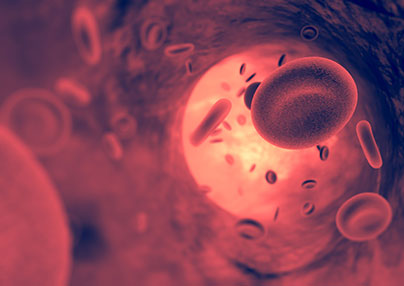Anemia is defined as a deficiency of red blood cells or of hemoglobin in the blood. There are many forms and causes of anemia, and it can be temporary or permanent.

There are many types of anemia. The most common form is iron-deficiency anemia, which can be caused by blood loss or poor nutritional intake of iron. Other causes include:
Many times very mild anemia is not felt, but for more significant cases, some symptoms may be indicators of anemia, and may include:
If young children are anemic (particularly if they are iron-deficient) they are at an even higher risk of retarded brain growth and development. Supplying a diet adequate in nutrients that help prevent anemia, such as a Nutritarian diet, is important, particularly in the very young.
As there are many causes of anemia, this section will primarily address anemia related directly to nutrient deficiencies. For other causes of anemia, the solution involves correcting or controlling the root cause (diabetes, autoimmune disease, cancer, etc.) if possible.
If iron deficiency is suspected, then the cause should be found out for each individual, such as whether or not it is from bleeding, which would require finding out where the bleeding is coming from (heavy menstruation, gastrointestinal bleeding, etc.) or whether it is from low intake of iron-containing foods. In either case, the treatment strategy can include more iron-containing foods as well as an iron supplement if needed. Taking too much supplemental iron (as well as iron from animal products such as red meats) can be damaging to one’s health, so discuss iron-supplementation and duration with your doctor to make sure it is needed and that you do not drive your iron levels too high.
Here is a list of some healthy iron-rich foods to include as part of a Nutritarian eating pattern:
If B vitamin (folate, vitamin B12) deficiency is suspected then blood testing should confirm this, and eating more folate rich foods or supplementing with vitamin B12 may be needed. A Nutritarian diet is high in folate, but the risk of a deficiency in vitamin B12 increases as one decreases animal products, so supplementation of vitamin B12 is indicated.
Blood testing is the standard method for identifying anemia as well as most causes of anemia.
ONLINE: All members of DrFuhrman.com can search the Ask the Doctor archives for discussions on this topic. Platinum and Diamond members can connect with Dr. Fuhrman by posting questions in the forum. Not a member? Join now.
IN PERSON: Book a stay at Dr. Fuhrman’s Eat to Live Retreat in San Diego, California. With options ranging from one, two and three months (and sometimes longer) you will be under Dr. Fuhrman’s direct medical supervision as you hit the “reset” button on your health. For more information: (949) 432-6295 or [email protected].
EVENTS: Join Dr. Fuhrman for an online boot camp, detox or other event. During these immersive online events, you’ll attend daily lectures, follow a special meal plan, and have access to a special, live Q&A session with Dr. Fuhrman. Learn more about events.
The following are sample questions from the Ask the Doctor Community Platinum and higher members can post their health questions directly to Dr. Fuhrman. (All members can browse questions and answers.)
My two-year-old niece is pale and not feeling well. Upon taking her to the doctor, they found her to be anemic. The family eats the SAD diet, including lots of dairy, animal products, junk food, and so on. I’m assuming their SAD diet is the culprit. Is there anything else they should be looking at besides improving their diet? What can they increase in her diet (other than beans) to increase her iron levels?
Dairy product consumption, drinking cow’s milk in particular, is strongly linked to anemia in children. Frequent milk drinking results in repeated exposure of the intestinal lining to bovine milk proteins. In genetically pre-disposed children, this seems to cause a subtle, but prolonged, inflammation of the intestinal lining. This chronically inflamed lining membrane oozes a steady but microscopic film of blood off the intestine surface into the fecal stream. In this way, iron passes out of the body with the stool and is lost, resulting in iron-deficiency anemia in the child.
The other important issue is eating real food, not processed foods. Green vegetables, beans, raisins, apricots, figs, and many more plant foods have adequate iron too. If she is significantly deficient, however, it may be wise to use a children’s liquid iron supplement taken with meals until this problem is remedied. It can be added to a healthy smoothie or a soup, and she will likely not even know she is consuming it. Be sure to stay within the recommendations for iron appropriate for her age or under the guidance of your health professional.
I was diagnosed with anemia and was told that an ideal range for iron is 9–12; mine is 8. My doctor told me to eat red meat and take iron supplements. Is this really necessary? What foods should be emphasized? Other recommendations?
You should eat a Nutritarian diet. Green vegetables and beans contain iron. You do not have to eat red meat! A low dose iron supplement taken with meals and additional Vitamin C is effective, but do not continue to take iron forever. Excess can be harmful.